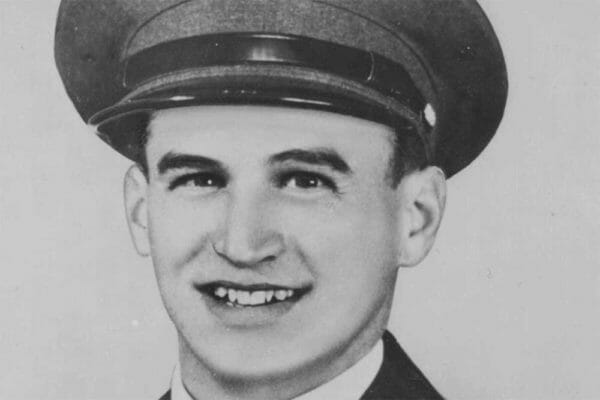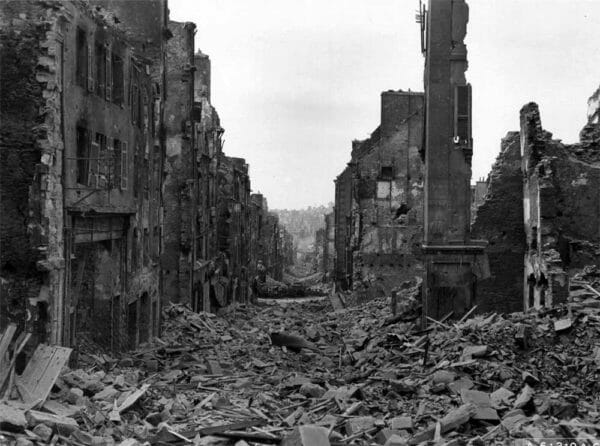By Katie Lange

USA – -(AmmoLand.com)- The Allies faced fierce resistance as they worked to free France during World War II. During that push, Army Staff Sgt. Alvin P. Carey went on a one-man grenade-throwing spree to take out a German stronghold. He didn’t survive the ordeal, but his efforts helped his unit seize the day. For his sacrifice, he earned the Medal of Honor.
Carey was born on Aug. 16, 1916, in the small town of Lycippus in western Pennsylvania. His father, Philip, died in 1919, so Carey grew up with his sister, Pearl, in nearby Laughlintown.

According to the newspaper the Latrobe (Pennsylvania) Bulletin, Carey enjoyed hunting and fishing, and he played baseball and football in school. He graduated from Ligonier Valley High School in 1935 and worked as a farmer and construction worker until Jan. 24, 1941, when he enlisted in the Army.
Over the next three years, Carey trained for the invasion of France. About halfway through that training, he married his sweetheart, Anna Mae Ankney.
Carey landed in France on June 7, 1944 — the day after the initial invasion of Normandy — with the 38th Infantry, 2nd Infantry Division. He was injured a month into his deployment and received the Purple Heart, but he was soon sent back to the front.
By August, the 2nd Infantry Division had been called upon to capture the French port town of Brest from the Germans. The town was key to an Allied plan to get supplies to the invading forces coming onto the continent from Normandy. By Aug. 7, the Allies had reached the town, and a bitter siege ensued.
On Aug. 23, 1944, Carey was in charge of a machine gun section tasked with attacking an enemy stronghold up a hill across the bay from Brest near a town called Plougastel. They were quickly pinned down by intense German machine gunfire coming from a pillbox about 200 yards up the hill.

Carey, who was covering the right flank, could have stayed in his position and returned fire. Instead, he set up his weapon to cover the position. Then he grabbed several hand grenades and a carbine rifle and started crawling up the fire-riddled hill alone.
About three-quarters of the way to the pillbox, Carey found a German soldier hiding in a foxhole and killed him with his carbine. He continued to crawl uphill.
When he got within throwing distance of the pillbox, Carey began chucking grenades, hoping to get at least one inside the hideout. He had to stand up at one point, which led to him being fatally shot. But before he fell unconscious, the 28-year-old mustered the strength to throw a few more grenades. One made it through the pillbox’s small opening, killing all the soldiers inside and silencing their guns.
Inspired by his bravery, Carey’s men quickly took over the pillbox and were able to overpower any remaining enemy soldiers in the area.

Nearly a month later, the Germans surrendered the city of Brest, but not before destroying practically everything and rendering the port useless to the Allies. The Allied invasions were moving faster than planned, though; by this time, Paris had already been liberated.
For giving his life to the cause, Carey earned the Medal of Honor. President Harry S. Truman presented it to his widow on May 21, 1945.
Carey was initially interred at a military cemetery in France, but his body was brought home in 1948 and reburied in Ligonier Valley Cemetery in Ligonier, Pennsylvania.
His memory lives on in his hometown and across the military. Carey’s alma mater, Ligonier Valley High School, also goes by the nickname Alvin P. Carey High School. The Carey Theater at Fort Lewis, Washington, was also named in his honor.

U.S. Department of Defense
The Department of Defense provides the military forces needed to deter war and ensure our nation’s security. The foundational strength of the Department of Defense is the men and women who volunteer to serve our country and protect our freedoms. Visit www.defense.gov/ to learn more.
